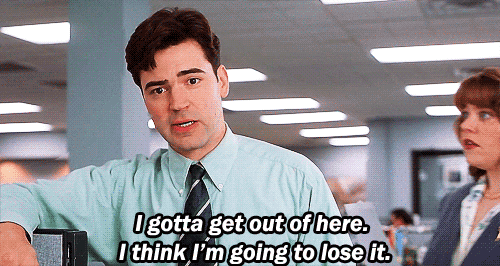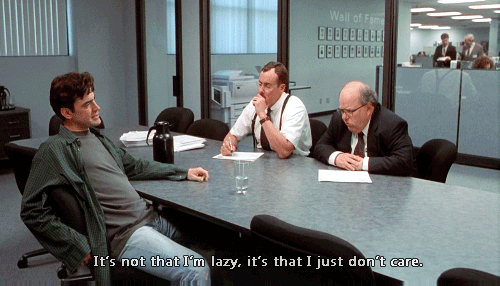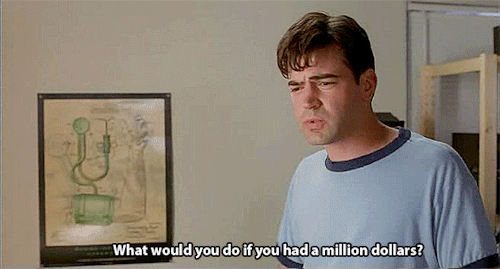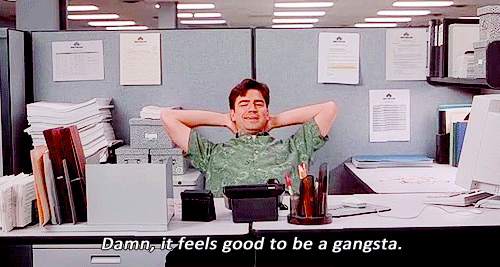It was my senior year of high school and I was going on my first date ever.

After I made her dinner, we decided to go to the local rental store to get a VHS, which was customary at the time. We walked the fluorescently lit aisles and white shelves to see a man covered in sticky notes. It was a new movie in the humor section, it must be good. We went back to her parent’s house and due to my lack of experience in the dating world, we actually watched the movie.
For the next hour, I got to lay on the couch next to a female and see one of the greatest comedies of all time. It quickly became the pinnacle of high school life as I proceeded to receive my first kiss. I left her house that night knowing two things… Kissing was fun and I never wanted to work an office job.
Office Space takeaways
In Office Space, Peter Gibbons works as a software engineer updating bank code for the expected Y2K crash. He finds his job boring and arbitrary, he wants to figure a way out of the rat race. He decides to use his friends’ coding skills to steal some money from his company. Hilarity ensues.

You get a fairly accurate glimpse into the life of a cubicle worker. You experience the office politics and the conformity that can suck your soul. You think, well this is just a comedy and everything is overdramatized. That’s what I thought until I started working as a temp in offices much like the one depicted in the movie.
That summer I was working data entry at a small company in the Chicago suburbs. Here I experienced the fact that if you actually try and do all your work, then people don’t know what to do with you. I didn’t understand that I wasn’t supposed to work as hard as I could all the time. I actually started asking other employees near me if there was anything I could do to help them. They couldn’t think of anything because they were already doing the bare minimum just to keep themselves from being fired.

I was living in a fictional movie world, but it wasn’t The Matrix, it was Office Space. I couldn’t stop bullets, I was too busy finding the best ways to procrastinate.

There are numerous one-liners and scenes that I remember from the movie, but it was this interaction that stuck with me almost 20 years later…
Peter Gibbons: Our high school guidance counselor used to ask us what you’d do if you had a million dollars and you didn’t have to work. And invariably what you’d say was supposed to be your career. So, if you wanted to fix old cars then you’re supposed to be an auto mechanic.
Samir: So what did you say?
Peter Gibbons: I never had an answer. I guess that’s why I’m working at Initech.
This is how I’ve spent the last 15 years of my life. Working a job because I didn’t have a better answer.
What if you had [1.55] million dollars?

First, you need to change this question to account for inflation. You would need to have about 55% more money in 2020 than you did in 1999, meaning you should ask,
What would you do if you had 1.55 million dollars?
Let’s get specific. I would pose the question as… What if you had no consumer debts (student loans, credit cards), no major health concerns, and a $1.55 million net worth (exclude home equity (you don’t get to leverage that), add all your savings and retirement accounts).
What would this money actually empower you to do? Before we get to the heart of the question, let’s dig deeper into the financials.
How much to never work again?
The basic factors that go into determining if you never need to work again are simple. You only need two pieces of information:
- How much you will be spending each year
- How much you have saved
Figuring out the first part can actually be difficult. Some of you may be using mint or personal capital to already track your spending. But even if you are doing that you need to really understand what you will actually be spending when you retire. What kind of lifestyle do you want? Will you be spending more or less? Just because you are making a salary of $75k right now, does not mean that is how much you need to be spending when you retire. Really look at your budget and figure out what may change and what may remain the same.
Since I don’t have your personal numbers, I’m going to use the average American (as of 2018).

Average American Budget
- Pre-Tax Income: $78,635
- Food & Beverage: $7,923
- Housing: $20,091
- Apparel and services: $1,866
- Transportation: $9,761
- Healthcare: $4,968
- Entertainment: $3,226
- Personal care products and services: $768
- Education: $1,407
- Cash contributions: $1,888
- Personal insurance and pensions: $7,296
- Other: $2,030
- Personal taxes* $11,000
- Savings: $6,411
Welcome average American, we’re going to plan your retirement. Again, I know nothing about you. You need to be an adult right now and analyze your own spending and retirement goals. But since I’m not a certified financial planner, let’s make some numbers up!
What will your income need to be in retirement?
Retirement Adjustment Assumptions:
- I’m assuming you have a paid-off house. This is possibly a terrible assumption, but you’re 65, you got a house at 35 and paid it off, I’m proud of you. This is tricky to calculate. $20k doesn’t disappear, you still have maintenance, property tax, and home insurance. I’m going to call this $8k.
- You’re also traveling less since you don’t have a job to go to, let’s bring transportation down 30%, $6832.
- Healthcare sucks, you probably want to play that safe, bump that 30%, $6459.
- You’re not paying for education anymore.
- You are no longer contributing to social security so your “insurance” should go away.
- Guess what, you still will get taxed, but it’s going to be much lower! I’m assuming as an average American you are married and will get a $24,800 standard deduction, leaving you $14,192 taxable income. That gets taxed at 10%, meaning you’ll need to spend another $1,419 in federal taxes.
- Throw another couple grand for state taxes and rounding and we’re at about $42k.

Rules of thumb say you will need 70-80% of your current income. Financial companies that want you to keep as much money as possible with them for as long as possible suggest it could be even more. But I think it can be done at 55%. Again, this is your retirement though and you need to adjust accordingly.
Here are some more resources on retirement spending:
- Smartasset.com: How Spending Changes in Retirement
- $15k reduction in spending or 70% of income.
- How to plan your retirement budget
How much do you need to have saved?
You have now figured out how much you need to spend every year. We’ll continue with the $42k number. You’re going to be alive for 30 more years and you need $42k a year, so you need… $42k X 30 = $1.26 Million. Done!
Oh wait, you forgot about inflation.
The average inflation of the last 30 years is 2.6% a year. This means next year you don’t need $42k, you need $42k X 1.026 = $43.1k, then the next year you need $43.1k X 1.026 = $44,221… this gets worse. Your last year alive you will actually need $88,414.
If you add the inflated 30 years of spending you would need $1,873,581.61 today.
Don’t panic though! This is how much cash you would need today if you never invested it. Savings accounts can get you close to 1.5%. But even better, if you keep your money in the S&P 500 Index Fund with ~0% fee you will get 8.25% annual gains over last 30 years.
Yes, you have to spend more each year thanks to inflation, but you will also be seeing your savings increase, much more!
If your savings increased each year by 8.25%, you would only need $600,000 to retire for 30 years.
Caution: You’ve entered the Danger Zone

Going deeper
Top Gun teaches us many life lessons.
- To sing You’ve Lost that Lovin’ Feelin’ whenever you’re at a bar or karaoke night.
- When you play beach volleyball, you play shirtless.
- And most importantly, to always high five your friends!

It also teaches us to not let our arrogance get in our way when lives are in danger.
Don’t be like Maverick and kill your Goose (that’s laying your golden eggs).

Yes, in theory, you could retire on $600,000 if you only needed to spend $42,000 a year in today’s dollars. But, that doesn’t mean you are guaranteed to have it all work out. You might think that the ups and downs of the market will even out, but you need to know about the sequence of returns risk.
Imagine you’re ready to retire with your $1 million in the bank, but the market crashes down 20% over the next year, it then stays roughly flat for four more years. You now have taken out $210,000 for your yearly living, and your savings is down to ~$600,000. You now are faced with living 25 years off of $600,000 instead of 30 years on $1 million. Do you feel as safe?

A way to judge how likely it is for you to survive retirement is to look at past years market performance, to simulate how you might fare. firecalc.com does this.
Here you can see that through 118 simulated years, only 40% of the time would you be ok to retire needing $42,000 a year if you had $600,000. Now for some of you, that might be worth a shot, but, it’s dangerous. This is your retirement, you don’t get a second chance.
Of course, this is just past performance. Even after the scary sprint, Stock values are extremely high. You shouldn’t pretend that we’re at the bottom of a depression and our savings will continue to increase.
I like to stay in the 90%+ chance range, here you can see that $1 million in savings gives you a 93% chance of success and $1.55 million actually is a 100% guarantee.
The 4% rule (of thumb)
When you are planning your retirement what you are really trying to answer is, how much money can I live off of each year and still have money for all my remaining years. This is your safe withdrawal rate. After you’ve figured out how much you can live off of, $42,000 in our hypothetical, you can use The Trinity Study (2018 Update), to help you figure out what your safe withdrawal rate.
The conclusion most draw from the Trinity Study is if you are going to live another 30 years, you can safely withdrawal 4% of your savings each year and safely retire. Meaning, if you have a million dollars, and you could live off of $42,000 a year ($1,050,000 X 4% = $42,0000, then you can retire. Thanks to math, you can also say that you can multiply your yearly withdrawal amount times 25 to figure out your Goose.
Hopefully, by now you are super excited. You have been given 1.55 million dollars, and you only need $1 million. You can actually live off of $62,000 a year, not that measly $42,000.

Things to consider
At this point, you officially have enough information to be dangerous. You’ve figured out your yearly living expenses and have a number of what you need for retirement. You now need to think about all the positive and negatives unique to your personal situation.
- Your gender, age, and life expectancy. Here’s a scary-ass site to help you figure out your life expectancy based on your age. Remember that the 4% is based on 30 years of retirement, if you have more or less, you need to adjust.
- Will you want to keep making income in some capacity? Most do, you should factor that in.
- Social Security, who needs it? Most people reasonably believe that SS will be gone by the time they retire I subscribe to the formula I just made up: 100 – 2*(65 – age). In other words, if you’re 15, don’t count on any. If you’re 65, you can count on all of it, if you’re 35, you’ll get maybe 40%.
- What type of accounts do you have? If you’ve been saving your nest egg in Roth accounts and don’t need it until you’re 65, you’re in a different situation than someone at 50 looking to retire with all traditional IRA/401K accounts.
Now What?
If you were like me, you didn’t think you could actually retire off of on $1.55 million. You actually have to figure out how you are going to live the rest of your life.
That’s simple, you’re obviously going to quit your job immediately.

Or are you?

You probably associate your job with keeping you from your dream. But, is there a job you would want to do? Maybe you can do your current job part-time, or remote or for a different company.
Don’t be so quick to just lay in the sand and drink margaritas.

No one is going to hand you a million dollars. But if you save half your money and invest modestly, there’s no reason you won’t get there. It may be 10 years, it might be 40 years, but you’ll get there. The question is, what are you going to do once you’re there?
This is how you should be spending your time.
Let’s see if I can find some movies to help me figure that out…